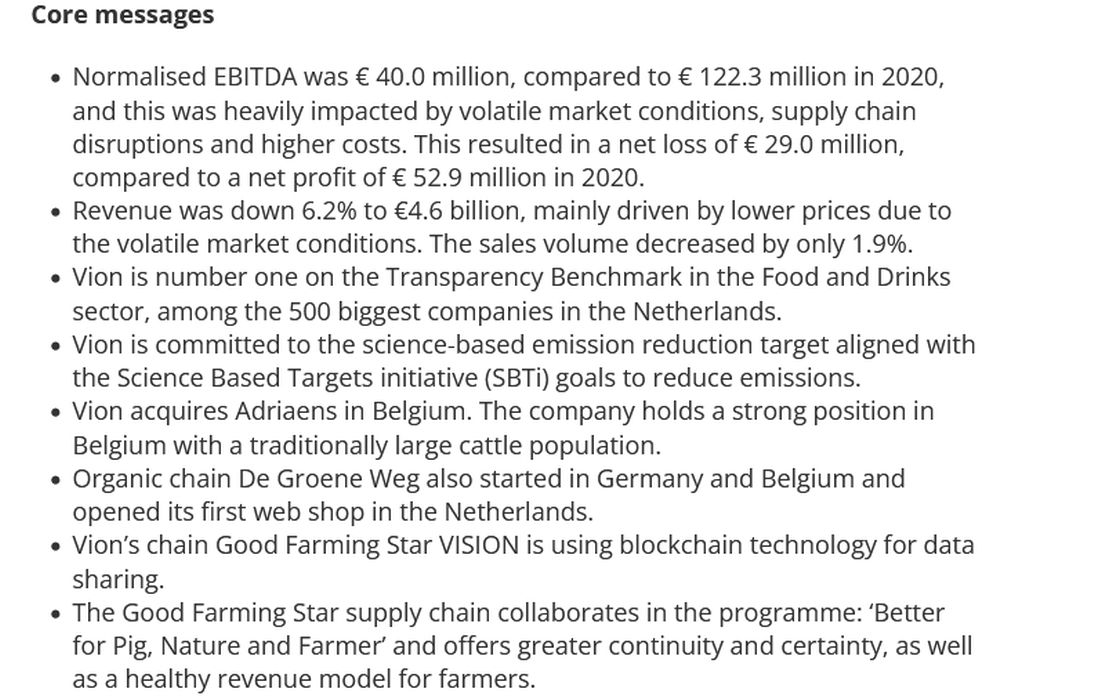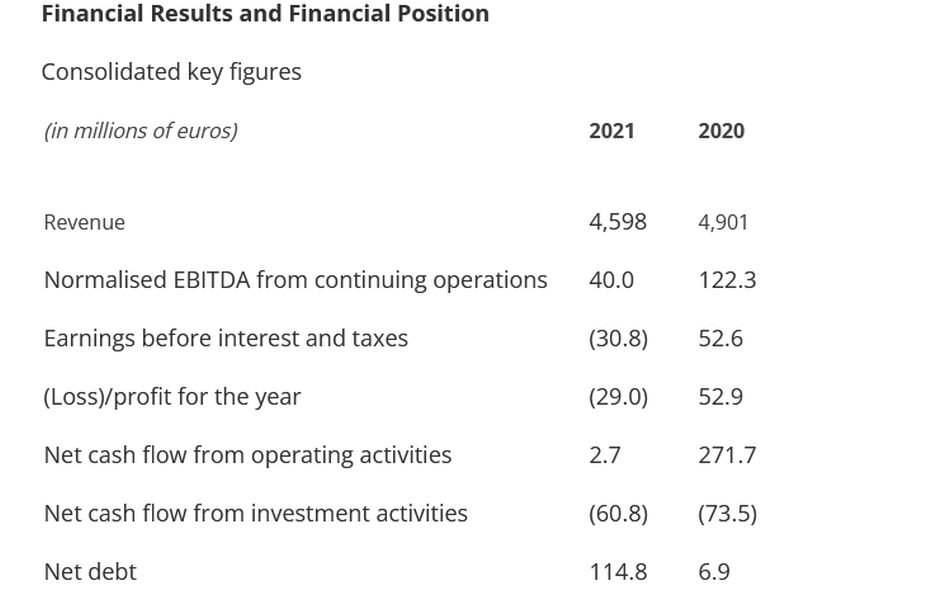Turbulent year for Vion Foods
2021 and the latest developments in the market seen this year are worrying executives from Vion Foods. In a statement posted on the company website, company's CEO Ronald Lotgerink warned about the difficult condition foreseen in the market. "The past year and the latest developments in our markets were characterised by an unprecedented combination of challenging global developments and market dynamics, which greatly affected our German operations in particular. The continued COVID-19 pandemic, African Swine Fever limiting exports from Germany especially to China, high inflation rates, the steep increase in beef prices and a strong increase in labour costs all had an impact on our company and markets in 2021. At the same time, we are accelerating our successful strategy of building short, closed supply chains based on market demand from our customers in partnership with our suppliers," Mr Lotgerink said.

External developments with an impact on Vion
The Pork Business Unit faced difficult conditions in Germany as a result of COVID-19 and African Swine Fever (ASF), which led to limitations on exports to Asia and especially China and much lower pig herd sizes. The strongly reduced demand for pork products in China resulted in an excess of pork in Europe, particularly Germany, causing pork prices to drop significantly.
The markets for beef saw a different scenario with a decreasing supply in combination with steady demand. During the year, the price of beef increased and this accelerated towards the end of the year. The price increase had an impact on Vion’s margins. Price increases for fresh meat have a time lapse period in which customers need to adapt, and this put Vion’s margins under extra pressure.
On 1 January 2021, Germany’s new Occupational Health and Safety Act for the meat industry came into effect, which has the goal of banning flex workers from the industry. In all German locations, Vion therefore welcomed subcontracted employees into permanent employment. The investments related to this new legislation had a heavy impact on the profitability of the company.
The war in Ukraine also has consequences for food supply chains. Vion expects higher purchase prices for cattle, partly as a result of increases in the price of raw materials for cattle feed and higher energy costs. Price inflation and the consequences of the war will also have an effect on the prices of meat and meat products. Vion has no activities in Russia and limited in Ukraine.
Changing social requirements
Vion offers customers increasing transparency, products that can guarantee welfare for animals and can be traced back to their origins, but also climate protection efforts, increased biodiversity and regional sourcing. At the same time, farmers are asking for more stable pricing to invest in increased requirements for animal welfare and emission reduction measures. Ronald Lotgerink: “We understood that changes in our society would also have an impact on our industry and we used this realisation to decide our strategy early on. We are building the food supply chains that our customers are demanding in which transparency is the starting point for every partner. Since 2016, we have published all our reports on animal welfare and food safety on our website, and we publish our Corporate Sustainability Report annually. In a biennial survey on transparency among the 500 largest companies in the Netherlands, we became number one in the Food & Drinks sector with our reporting in 2021. Our commitment to the Science-Based Emission Reduction Target, or SBTi, is another step we are taking to actively reduce emissions and build more sustainable food chains.”
Highlights of 2021
At the beginning of the year, Vion added beef producer Adriaens based in Zottegem, Belgium to its portfolio, making Belgium its third home market after the Netherlands and Germany. This strengthens the company’s regional presence. The Vion Adriaens site is located in the middle of the Western European region for beef cattle.
The organic chain De Groene Weg opened a web shop for consumers of organic meat and processed meat products. Customers can place their order online for delivery to their home or a local butcher’s shop. De Groene Weg was also introduced in Germany and Belgium. The more than 100 farmers who supply pigs to De Groene Weg are members of a suppliers’ association and are all certified with the European Organic standards (SKAL), EKO and the Dutch Beter Leven 3-star label.
In the plant-based Vion concept ME-AT the alternative a next step was taken with the use of more plant-based proteins from Dutch soil instead of soya that often comes from outside the Netherlands. Farmers’ organisations ZLTO, Agrifirm, Herba Ingredients and ME-AT the alternative want to contribute to the plant-based protein transition towards a sustainable food chain for future generations. In 2020, 30 hectares were sown with broad beans and the first products are now being sold by retailers.
In 2021, Vion connected the Good Farming Star pork supply chain to the ‘digital highway’ by means of blockchain technology. Good Farming Star VISION connects supply chain partners (e.g. feed suppliers, farmers, logistics service providers and retailers) to exchange data. This guarantees the origin and integrity of its products and creates trust among all partners. The Good Farming Star supply chain is the first in the sector to be connected through blockchain technology. Other supply chains will follow in the years to come.
Vion has added product integrity monitoring by using the DNA of animals and their end products. The DNA of all Good Farming Star sows and organic sows is analysed and stored in a DNA databank. It provides the ultimate check for customers, while demonstrating product integrity throughout the supply chain.
A select group of 100 Dutch pig farmers working within the Good Farming Star supply chain was asked to take part in a new programme named ‘Better for Pig, Nature and Farmer’. The farmers receive a premium for their investments in animal welfare, biodiversity and reducing CO2 emissions. The programme offers greater continuity, security and a healthy revenue model.
Together with the Dutch Society for the Protection of Animals, Deloitte and Eyes on Animals, Vion has developed a system to improve the effectiveness of camera surveillance in all areas of slaughterhouses where animals are handled. The Artificial Intelligence (AI) camera system analyses the movements of animals and humans. The software is used to help to improve the well-being of the animals. It is a system that is now being implemented throughout the industry.
In close cooperation with two farmers’ organisations and the food retail organisation, Vion developed and introduced Simmental PUR with the Geprüfte Qualität Bayern certificate. This regional beef programme offers beef from the Simmental brand with a Bavarian origin.
Based on the positive feedback from customers, Vion developed Robusto, a selection of pig cuts such as leg and belly meat originating from trusted and professional pig farmers with the right fat and intramuscular fat content and cut to specification, for the top segment of dried premium Parma and Serrano hams on the Italian and Spanish market, and for pork belly in the South Korean market.

The Department of Climate Change, Energy, the Environment and Water (DCCEEW) has adopted a new Au...

In early April, the management of Danish Crown announced that it would split the Danish Crown Bus...

Beef + Lamb New Zealand, DairyNZ, Dairy Companies Association of New Zealand, Deer Industry New Z...
